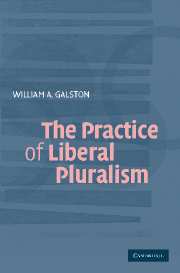Book contents
- Frontmatter
- Contents
- Acknowledgments
- 1 Introduction
- PART I PHILOSOPHICAL FOUNDATIONS OF LIBERAL PLURALISM
- 2 Value Pluralism and Its Critics
- 3 Political Pluralism and Limits on State Power
- 4 Expressive Liberty and Constitutional Democracy: The Case of Freedom of Conscience
- PART II LIBERAL PLURALISM AND PUBLIC ACTION
- PART III POLITICS, MARKETS, AND CIVIC LIFE IN LIBERAL PLURALIST SOCIETIES
- PART IV DEFENDING LIBERAL PLURALISM
- Index
2 - Value Pluralism and Its Critics
Published online by Cambridge University Press: 18 December 2009
- Frontmatter
- Contents
- Acknowledgments
- 1 Introduction
- PART I PHILOSOPHICAL FOUNDATIONS OF LIBERAL PLURALISM
- 2 Value Pluralism and Its Critics
- 3 Political Pluralism and Limits on State Power
- 4 Expressive Liberty and Constitutional Democracy: The Case of Freedom of Conscience
- PART II LIBERAL PLURALISM AND PUBLIC ACTION
- PART III POLITICS, MARKETS, AND CIVIC LIFE IN LIBERAL PLURALIST SOCIETIES
- PART IV DEFENDING LIBERAL PLURALISM
- Index
Summary
In Liberal Pluralism, taking Isaiah Berlin as my point of departure, I offered an extensive description of value pluralism but a parsimonious defense. I suggested that ordinary moral experience is consistent with value pluralism and that proposed alternatives to pluralism encounter serious difficulties. I argued that utilitarianism (the most prominent form of modern monism) is insensitive, not only to the separateness of persons, but also to the heterogeneity of goods. In this chapter, I reverse the emphasis of Liberal Pluralism. I provide a summary description of value pluralism and then defend it at some length by considering a range of philosophically significant objections that have been raised in recent years.
VALUE PLURALISM: A SUMMARY DESCRIPTION
Following Charles Larmore and others, I distinguish value pluralism from various forms of nonpluralist accounts of morality. A theory is nonpluralist, I say, if it either (a) reduces goods to a single measure of value or (b) creates a comprehensive hierarchy or ordering among goods. (Theories that do [a] are usually called monistic.) A moral theory is pluralistic if it does neither (a) nor (b).
Value pluralism is not relativism. The distinction between good and bad, or between good and evil, is objective and rationally defensible.
According to value pluralism, objective goods cannot be fully rank-ordered. There is no common measure of value for all goods, which are qualitatively heterogeneous. There is no summum bonum that is the chief good for all individuals. There are no comprehensive “lexical orderings” among types of goods. And there is no “first virtue of social institutions,” but, rather, a range of public values the relative importance of which will depend on particular circumstances.
- Type
- Chapter
- Information
- The Practice of Liberal Pluralism , pp. 11 - 22Publisher: Cambridge University PressPrint publication year: 2004



